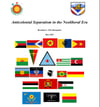Anticolonial Separatism in the Neoliberal Era (DIGITAL COPY)

In an era of concentrated capital, concentrated power, and deteriorating political conditions, separatism has yielded itself as a vehicle for marginalized populations to uplift themselves. Amid a wavering liberal international order, this thesis serves to provide a better understanding of how populations free themselves, and what challenges they face in doing so. From the question of what impacts the capability of separatist movements to secede in the neoliberal era, I argue that state coercion, state co-optation, and internal dynamics of a movement impact this capability to secede. I compare separatist movements with internally decentralized characteristics to those with internally centralized characteristics in how they respond to mutual challenges. The cases of decentralized Rojava in the Levant and centralized Artsakh in the Caucasus are closely observed and contrasted as movements that have resisted intersecting problems in the neoliberal era. I find answers to the question of why Artsakh collapsed while Rojava has not. Late-stage statism is also included in this thesis as a new theoretical approach to describe the pattern of an increasingly authoritarian international system.
Table of Contents:
Abstract - p. 4
Introduction - p. 5
Literature Review - p. 8
I. Conceptualizing Separatism - p. 8
Anticolonialism - p. 9
Neoliberalism - p.10
II. State Involvement - p. 12
Coercion - p. 12
Paramilitaries and Information Warfare - p. 12
The Megapole - p. 14
Co-Optation - p. 14
Federalization - p.15
Dependence on Backers - p. 16
III. Internal Dynamics - p. 17
Decentralization - p. 18
Centralization - p. 19
The Discussion - p. 22
Methodology - p. 23
Rojava - p. 25
Contextualizing Rojava - p. 25
State Coercion of Rojava - p. 29
Syrian State Coercion - p. 29
Turkish State Coercion - p. 31
State Co-Optation of Rojava - p. 35
Syrian State Co-Optation - p. 35
Russian State Co-Optation - p. 37
US State (and Corporate) Co-Optation - p.39
Framework of the Rojava Revolution - p. 42
Political Structure of Rojava - p. 43
Disaster Relief - p. 45
Tekmîl and Hevaltî - p. 45
Women’s Participation - p. 46
Flaws in the Democratic Confederalist Structure - p. 47
Rojavayî Perspectives - p. 48
Artsakh - p. 52
Contextualizing Artsakh - p. 52
State Coercion of Artsakh - p. 58
Azerbaijani State Coercion - p. 58
Turkish State Coercion - p. 62
State Co-Optation of Artsakh - p. 64
Armenian State Co-Optation - p. 64
Russian State Co-Optation - p. 66
Framework of the Artsakh Resistance - p. 69
Political Structure of Artsakh - p. 70
Nationalizing Architecture - p. 71
Disaster Relief - p. 71
Rise of the Artsakh Defense Army - p. 72
Fall of the Artsakh Defense Army - p. 74
Addressing Human Rights Abuses - p. 77
Armenian and Artsakhi Perspectives - p. 80
Analysis - p. 85
Effects of Neoliberalism and the State - p. 85
(Re)Structuring Resistance - p. 86
Conclusion - p. 90
Navigating the Tide of Interference - p. 90
Potential Problems in the Research - p. 93
Our Standing in the Anthropocene - p. 96
Bibliography - p. 97
